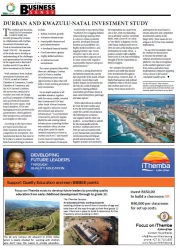Durban Investment Promotion Agency - Durban and KwaZulu-Natal Investment Study2016-12-02 The Durban and KwaZulu-Natal (KZN) Investment Location Study was recently produced by Deloitte in collaboration with Durban Investment Promotion and Trade & Investment KwaZulu-Natal (TIKZN). The purpose of the study was to develop an understanding of the challenges and opportunities for investing in the region and to find out if Durban and KZN are able to drive investment in the future.
With assistance from Durban Investment Promotion and TIKZN, as well as Durban Chamber of Commerce, iLembe Chamber of Commerce and the KZN Growth Coalition, the survey was conducted in October 2016 with 59 foreign and local companies of differing sizes and from all industries within the KZN region. Only board members, CEOs and managing directors answered the questionnaire, which gathered their perspectives, perceptions and insights on this topic. According to the report there are many factors that can make locations attractive and competitive for investment. The fundamental factors that need to be in place to attract investment from local and foreign investors include:
An in-depth analysis of all available statistics, together with the survey results, revealed that Durban and KZN lead other South African locations with regard to attractive social environment and attractive infrastructure. "Good maritime connectivity, attractive logistic platforms and existing inland infrastructure extending further into southern Africa are seen as big draw cards for export oriented industries to invest in Durban and KZN," said Russell Curtis Head of Department, Durban Investment Promotion. Conversely, it was reported that "Durban/KZN is lagging behind Johannesburg/Gauteng when it comes to robust economic growth, developed financial markets and availability of a highly skilled workforce, and lagging behind Cape Town/Western Cape in the area of good innovation capacity and to some extent with regard to sound public finances and good administration." However, a strong deterrent for investment remains the current lack of growth of the South African economy. Factors that could further impact on investment are the risk of a credit downgrade caused by ongoing political uncertainty, governance issues at state owned enterprises, patronage and state capture. When asked about an outlook for 2030 for both Durban and KZN, the survey panel named under the current circumstances the following two scenarios - one negative and the other one positive - as most likely to unfold for the municipality and the province. Durban and KZN in 2030 are seen as locations with a very bureaucratic and political environment that will impact growth and investments. This negative scenario was ranked by the respondents on a scale from one to five, with one indicating 'not at all likely' and five 'extremely likely', with a score of 3.51 (close to 'very likely' to happen). On the other hand, Durban and KZN in 2030 are seen as the leading tourist destinations in South Africa - a positive scenario with a slightly lower score of 3.38, but nevertheless thought of by the respondents as likely to happen. The scenario for tourism is positive and viable that should drive investments throughout the province. However, fears of higher bureaucracy and political instability relate to the key issues that Durban and KZN are facing. These issues need to be addressed in the near future to remain attractive and competitive investment locations in the longer term. These issues are not unique to KZN, but have national implications. "In our 2030 investment vision for Durban we should strive to become the premier sub-Saharan investment and export platform. One that is recognised as the southern gateway to and from Africa, and where most multinational companies targeting Africa choose to be located," concluded Russell Curtis. ï® For the full report: https://www2.deloitte.com/za/en/pages/infrastructureand-capital-projects/articles/durban-andkwazulu-natal-investment-survey.html |
Durban Investment Promotion Agency - Durban and KwaZulu-Natal Investment Study
Copyright © 2024 KwaZulu-Natal Top Business
